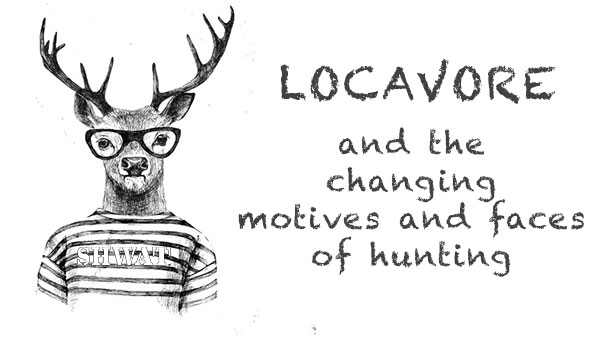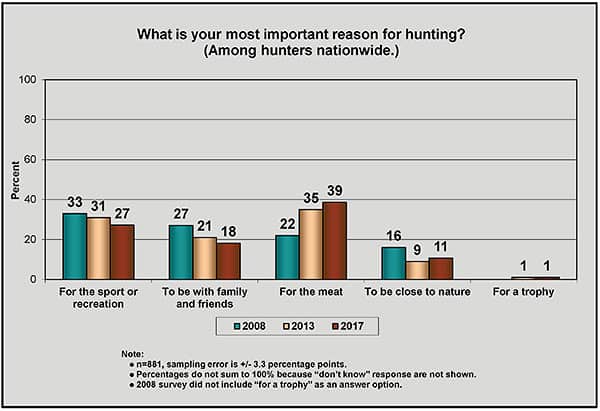
It’s been said that the only constant is change. While that’s debatable, I was surprised to see the results of a survey released just one week ago. What motivates hunters as a whole has indeed changed. Well aware that surveys can manipulate results by how questions are phrased, etc., I was very pleased to discover that Responsive Management, the company behind the survey, has been tracking hunting participation for most of thirty years. It turns out that we might ought to talk about this topic at a hipster coffee shop. If we titled our laid back informal discussion there we’d use just one word: Locavore. There’s more to it than that, but this is a most interesting and significant part of the conversation.
The locavore isn’t actually a Jurassic Park reincarnation of a heretofore undocumented group of dinosaurs. It’s a movement. Per Responsive Management:
… a growing national trend reflecting interest in eating locally and taking a more active role in the acquisition of food, especially organic, free-range, chemical- and hormone-free meat. Through the locavore movement, individuals from nontraditional hunting backgrounds have flocked to lessons and seminars offering instruction on how to hunt and process game meat. Locavore hunters are often educated millennials who hail from urban and suburban areas; lacking traditional hunting mentors, they nonetheless have been moved to take up hunting as adults for reasons of self-sufficiency, health, sustainability, or a desire to reconnect with nature.
Akin to the Farm to Table genre, Slate.com points to the bearded bicycle riding hunter locavore as far back as 2012. Clean shaven Facebook Pied Piper and Founder Mark Zuckerberg might be the poster boy for the movement, though. He’s on record saying, meat “tastes doubly better when you’ve hunted the animal yourself.”
At least for those of us in modern times, it seems hunting with meat as the primary motivator is a growing trend.
Whereas the sport or recreation was the most popular reason for hunting roughly a decade ago (when about one in three hunters gave this answer), hunters beginning in 2013 have most often named the meat as their primary motivation for going afield. And while the percentages of hunters naming one of the other three reasons have declined or remained flat over the past decade, the proportion of hunters who say they hunt mostly for the meat has almost doubled. – Responsive Management

If you’re not chasing trophies, hunting can be a very economical means of meat procurement. But that doesn’t fully account for the trend.I’ve eaten elk in the home of a wealthy sixty year old entrepreneur. He hunted the elk, shot the elk and prepared the meal for me and other guests. Ironically, you can pay big bucks for the same wild hog meat in restaurants that many of us have left for coyotes to clean up or shared with needy families.
The locavore movement has grown to the point that fish and wildlife agencies are beginning to take seriously the recruitment and retention potential of this new category of hunter. Responsive Management recently worked with the Southeastern Association of Fish & Wildlife Agencies’ (SEAFWA) Committee on Hunting, Fishing, and Wildlife-Related Participation and the Midwestern Association of Fish & Wildlife Agencies’ (MAFWA) Recruitment and Retention Committee to evaluate the outcomes of a series of pilot programs designed to promote hunting and fishing among young adults in urban/suburban settings. The programs targeted individuals who were interested in locally grown or organic foods.
The locavore movement was also examined in Hunting, Fishing, Sport Shooting, and Archery Recruitment, Retention, and Reactivation: A Practitioner’s Guide, a new handbook produced by Responsive Management and the National Shooting Sports Foundation. The handbook, which covers recruitment, retention, and reactivation (R3) strategies and issues consistent with the ones identified in the National Hunting and Shooting Sports Action Plan, also features a series of on- the-ground vignettes written by R3 professionals and academics. Several of these vignettes focus on the potential for people to be recruited into hunting through locavore motivations.
Finally, the growth of the locavore movement has become important enough to warrant exploration in a recent documentary. An Acquired Taste, a new film from producer/director Vanessa LeMaire, follows three teenage locavores as they decide to learn how to hunt as a way of connecting with the source of their sustenance.
“Without the data, I never would had suspected there was a trend this big,” says LeMaire. “Responsive Management’s The Sportsman’s Voice and The Future of Hunting and the Shooting Sports had been key in my research, but it wasn’t until they crunched some numbers that I realized there was an opportunity to reach out to this new demographic. The statistics were essential to the film.”
LeMaire also notes the positive reception the film has enjoyed among non-hunting foodie crowds. “So far, the film is proving to be a great eye opener to non-hunters who seek alternatives to factory farmed meat. The experiential style of the film invites non-hunting audiences to live their first kill through the journey of the three teens. Because the adolescents are so authentic, one can’t help identifying with them.”
She continues, “We’ve had youth and adults stand up after a screening sharing their transformation, and people choking up saying that they had never understood their father or brother’s hunting habits until now, and that, at last, they felt reconciled.”
An Acquired Taste is the winner of a “Best Youth Film” award and screened at the American Conservation Film Festival, the San Francisco Green Film Festival, the Colorado Environmental Film Festival, the Wild & Scenic Film Festival, and many more. Today, a number of state fish and wildlife agencies are considering integrating the documentary into their conferences, hunter education programs, and fundraising events. The documentary’s trailer can be viewed here.
From rural residents who have stalked game their entire lives to urban millennials who have only recently become locavores, an increasing number of hunters today are heading into the field first and foremost for the meat. This latest research on hunter motivations reconfirms the value of hunting as a source of sustainably harvested organic meat, in addition to its economic, recreational, social, and naturalistic benefits.
Why do you hunt? Share your thoughts in the comments below, no login required.
Special Thanks to Mark Damian Duda, Executive Director of Responsive Management for permission to share his publication.


Great article! I personally think there could be another factor influencing hunting for meat. There is a movement in this country to return to a more self sustaining life style. I personally want to be more self reliant and capable of sustaining myself and my famiy.
My first “knee-jerk” reactions was, oh great now the yuppies are getting into the act. But you know what – I love it! And to tell you the truth they may not be yuppies. It’s just that the millennial mind set is so foreign to me being a baby boomer that I tend to view them all in one way – which is wrong. I’ve been involved in the hunting, shooting, and outdoor sports my entire life and it worries me that the recruitment of new hunters is low. So if the millennials want to be Locavore hunters I am more than welcoming that movement. You asked, “Why do I hunt?” It depends on the game animal, but over all it is for the sport. While deer hunting I am strictly a trophy hunter and any trophy I harvest the meat goes to someone that needs it or wants it. For the pigs I hunt, it is mainly for the sport. The turkey I hunt is for the sport and the meat. The dove, quail, and ducks is for the sport. So yes, over all I hunt for the sport.
It is obvious that hunting for the ‘sport’ of killing animals by people like JB has been the reason my generation (I am 46) and those after, has not been involved in the tradition of hunting, vis-a-vis this story. Our collective attitudes and mores have changed since the more conscientious ‘Yuppies’ took the stage and killing of other mammals for sport by some hunters, perhaps most, has not helped the tradition. I recently began this avocation for the sake of providing quality food for my family, not because I love guns and using them to kill things…for fun. So as a locavore I must keep my new pursuit a secret, as I see it, thanks to sport hunters. Maybe us locavores, young and old, can save the once great tradition of game hunting.